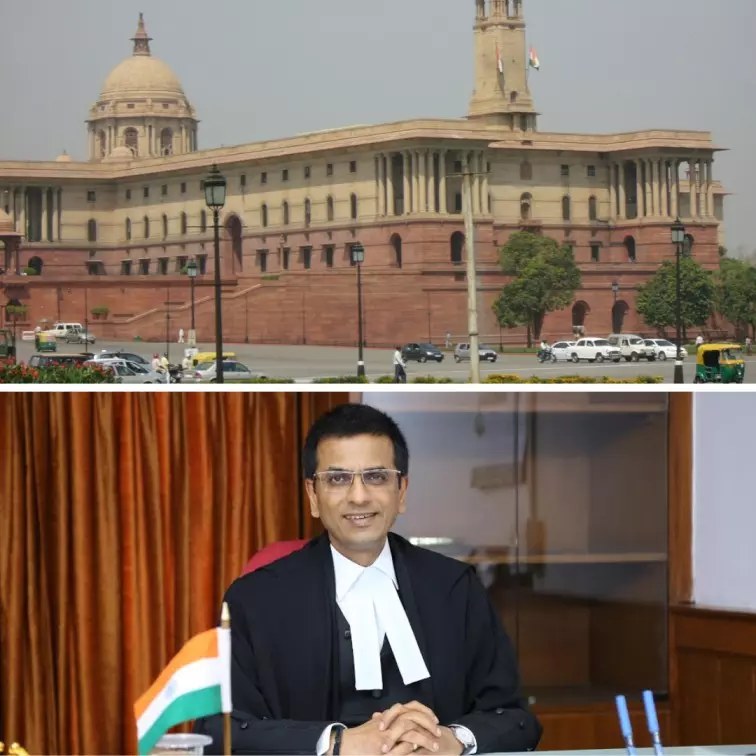
Image Credits: Wikimedia, Wikimedia (Representational)
No Plans To Revise Age Of Consent, Says Centre Despite CJI Chandrachud's Appeal
Writer: Hardik Bhardwaj
He is a student of SIMC, who is organized and able to meet deadlines in a fast-paced environment.
India, 22 Dec 2022 12:12 PM GMT
Editor : Jayali Wavhal |
She writes about gender issues, human interest, and environment.
Creatives : Hardik Bhardwaj
He is a student of SIMC, who is organized and able to meet deadlines in a fast-paced environment.
The POCSO act of 2012, which was passed to protect children from sexual abuse and sexual offences, defines a child as anyone under the age of 18. The Act was further revised in 2019 to deter offenders and stop similar crimes against children by adding harsher penalties.
Despite the appeal made by the Chief Justice of India D Y Chandrachud to reconsider the age of consent provision of the Protection of Children from Sexual Offences (POCSO) Act, 2012, the central government, on Wednesday, clarified that it does not intend to lower the legal age of consent for intimate relationships.
Smriti Irani, the Minister for Women and Child Development, gave the written response to the query raised by Rajya Sabha MP Binoy Viswam.
Centre's Response To Appeal
The question raised by Viswam was: 'Whether Government is considering any proposal to reduce the age of consent from 18 to 16 years under the Act to prevent the criminalization of consensual relationships between teenagers?' Responding to this question, Irani gave a short written response which said 'Does not arise'.
The CJI had earlier explained that the POCSO Act presents an odd challenge because it criminalises all sexual activity for persons under 18, even when consent was present between two minors.
According to Smriti Irani, the POCSO act of 2012, which was passed to protect children from sexual abuse and sexual offences, defines a child as anyone under the age of 18. The Act was further revised in 2019 to deter offenders and stop similar crimes against children by adding harsher penalties, including the death penalty, for sexual offences against children.
Irani stated that if any question arises about the age, it shall be determined by the Special Court after convincing itself regarding the age of the person, and it shall record in writing its reasons for such finding. She also said that the age for attaining majority under the Majority Act of 1875, as revised in 1999, is also 18, according to The Tribune.
Age Of Consent Around The World
The age at which someone is considered capable of giving their consent to sexual activity is regarded as the minimum age of sexual consent. Adolescents are intended to be protected from harm and potential consequences of early sexual involvement by establishing a minimum age for consent.
Most nations have set the legal age of consent to sexual relations between 14 and 16 years old. Few countries have consensual age below 14 or above 16 as well. At 11 years, Nigeria has the lowest age of consent, followed by The Philippines and Angola, with 12 years. The legal age of consent is 13 years in Japan and South Korea. Meanwhile, in 76 countries, the consensual age is considered 16. Many countries from Europe and Asia follow 16 as the minimum age for consent. However, certain nations forbid unmarried couples from engaging in sexual activity, such as Yemen, the United Arab Emirates, Saudi Arabia, Qatar, Pakistan, and Iran.
India's Position On Lenient-Conservative Scale
India currently drifts to the right on the lenient-Conservative scale. Most liberal countries choose 16 as the ideal age of consent. This shows their intent to take a lenient view of such relationships. Along with CJI, several High Courts have repeatedly urged the centre to reconsider the age of consent amid glowing evidence of the repeated misuse of the law. Based on a report by the Enfold Proactive Health Trust, Bengaluru, they discovered that 80.2% of POCSO cases were submitted by parents or relatives of the girl participating in consensual sex. In 87.9% of these situations, girls explicitly admitted to having a romantic or consenting relationship with the accused, which contradicts the prosecution's argument. The report also discovered that 93.8% of 'romantic cases' handled under POCSO end in acquittal after a median amount of time of 1.4 to 2.3 years to be resolved by courts, thus, consuming time and energy for no reason.
Ideally, the legal minimum age for sexual consent should not be too liberal or too conservative. Discriminatory provisions, particularly those based on gender and sexual orientation, should be removed. Also, laws should avoid criminalising consensual sexual activity between underage adolescents without properly analyzing the context and willingness involved.
Also Read: Acts Of Mutual Love Between Minor Couple Not Sexual Assault Under POCSO: Meghalaya HC
 All section
All section














